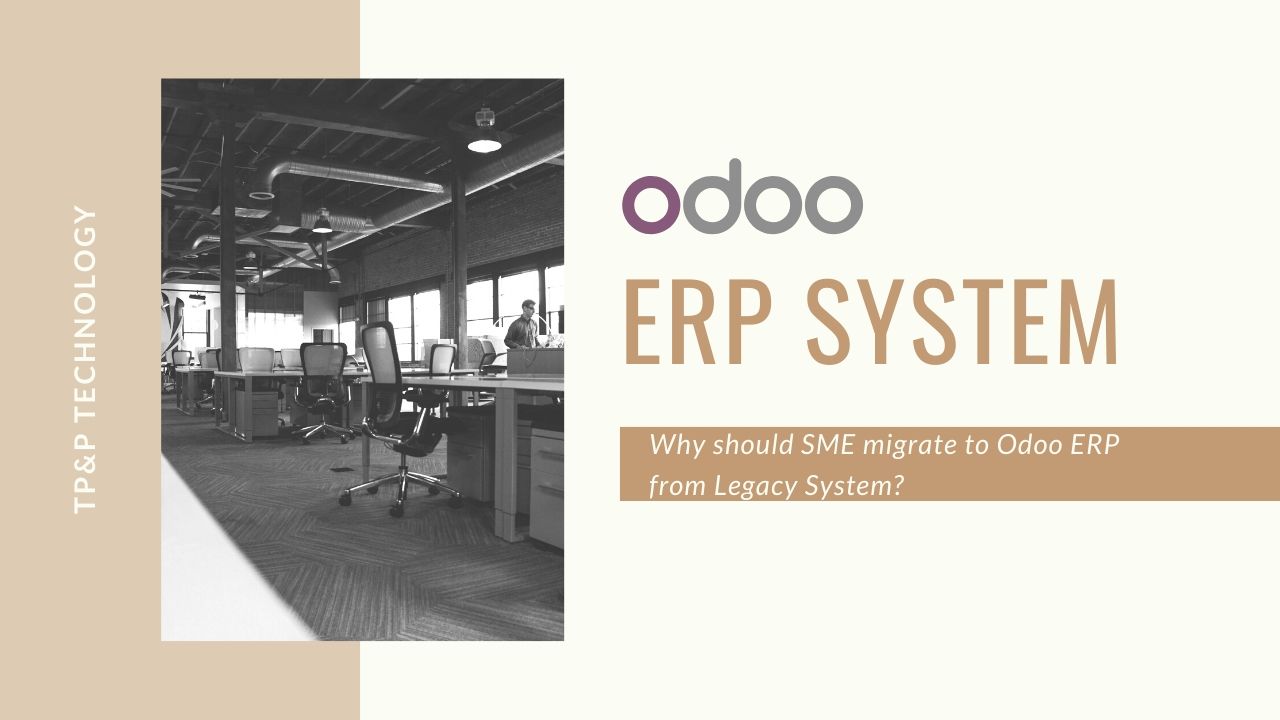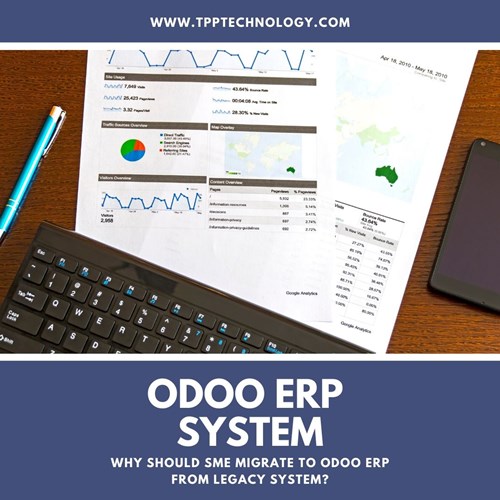
Why should SME migrate to Odoo ERP from Legacy System?
The global ERP software market is projected to grow by 18.91 billion USD during the period from 2019-2023, with a compounded annual growth rate of 9% - according to a report by Technavio.com. Such statistics demonstrate a strong demand and potential for ERP software, from various businesses of different sizes and across industries.
According to the same report, one of the key drivers for this market will be the increase in demand from SME for ERP software. Reasons leading to such an increase in demand include the need for digital transformation, deploying new technologies to keep up with the new digital economy which going on 24/7, thanks to the rise of mobile shopping & e-commerce, and ultimately providing a seamless experience to customers across channels.
ERPs software are increasingly being adopted across SMEs for the optimization of their business operations, while enhancing collaboration, productivity and speed-up product time-to-market. Also, ERPs provides effective planning and centralizing data from various sources and departments into one single source of truth – allowing real-time or near real-time data access for informed and data-driven decision making.
For SMEs that looking to implement their ERP system, Odoo ERP system could be an all-in-one solution fitting many of your particular business requirements. Odoo ERP is flexible and easily deployable, can replace outdated legacy systems for overall business process improvement.
Legacy vs. Odoo ERP
Currently, many small-medium business organizations are still operating under legacy software, and some will continue to stay within that comfort zone, yet decision-makers need to look into the new modern solutions such as Odoo ERP to adapt and meet the constantly evolving market demand. Odoo ERP can also allow businesses to greatly reduce manual labor and improve business efficiency.
Empowering businesses with advanced technology tools is critical to ensure organizations can keep up with the lightning-fast advance of digital transformation solutions.
Here are the reasons why businesses should consider upgrading/migrating from legacy into a modern ERP solution like Odoo:
Expensive maintenance & Security risks
Legacy system is outdated and inefficient, and its maintenance costs can easily exceed the cost of replacement, especially when the system gets older. As a result, business IT budget spent on maintenance and only leaves a fraction addressing business challenges which getting more complicated.
Outdated software systems are highly prone to security risks and cyber-attacks. Once a system is near its end of the lifecycle, support will be ceased leaving organizations operating on those legacy systems vulnerable.
In particular, companies may lose data and information when legacy systems fail. It could be challenging to find staff who know those obsolete programming languages to repair the system. Outsourcing the task system maintenance may also become more expensive than usual due to a lack of IT professionals who are well-versed in such a system.
Inaccessibility of data
Many legacy software were built back in the day where business functions were working in silos, and people shopping habits were still done mostly in traditional brick and mortar stores. Business data from each department were not stored in one central place but separate silos.
Continue operating on legacy means businesses would miss out on the opportunities on growing and scaling up, as well as limiting mobility and flexibility. More importantly, under legacy system, it’s very likely that there is data duplication and the data itself could be out of date, inaccurate and incomplete. Such inefficiencies hamper business growth and slow down on competitive advantage.
On the contrary, web-based cloud ERP solutions like Odoo provide business organizations with a platform to access their data anytime, anywhere from a range of operating systems and mobile devices, whether it’s iOS on iPhone, iPad, or Android smartphone.
Operating under the SaaS model, new ERP solution license cost is priced according to the number of users monthly or annually, which allows organizations to effectively scale up and down according to their needs.
Migrating from legacy system to Odoo ERP empower organizations with smarter ways of operating business, while offering technological developments, allowing companies to maximize value creation across assets and operations lifecycles, ultimately driving profitability.
Why ERP is important for SME’s (Small and Medium Enterprises)
Digital transformation
One of the challenges which many SMEs currently facing today is a lack of a streamlined supply chain. To compete in the new digital economy, where large corporates have already successfully implemented their streamlined supply chain operation, SMEs need to prioritize their business process, including the automation of the supply chain. Among the methods to accomplish such a goal is through the adoption of a robust ERP system such as Odoo.
With digital transformation currently shaping the new business playground, transforming and enhancing processes, along with automation happening across industries, it’s fair to say that implementing an ERP solution such as Odoo is the critical differentiator setting business apart from competitors.
Effectively respond to market demands
As consumers are getting savvier in navigating the new channels of shopping, they will be more likely to opt for companies who listen and can respond to their needs quickly and properly, in a highly personalized way – by offering users the liberty to select capabilities that are best suitable to their needs. Customize and implementing an ERP system like Odoo can help to optimize on a wide variety of tasks, such as:
- Resources planning;
- Customer relationship management;
- Supply chain management
- more
With ERP system like Odoo, SMEs can significantly reduce the many manual errors from their operations, and improve the success of their business.
Conclusion
In an era when SMEs across the world are undergoing digital transformation it’s vital to consider the need for ERP system – to optimize and automate many functional areas, and streamlining data under one platform. This allows businesses to better control operational costs, augmenting decision-making, and increase sales as well as profit overall.
At TP&P technology, we work closely with our clients to help them understand their business process and identify pain points – to identify the process which needs improvement, ensure your ERP solution of choice can support your organization. Get in touch to discuss your ERP implementation project today!



